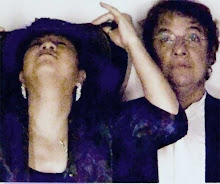 What makes the difference between a good jazz performance and a great jazz performance? A very good choreographer friend of mine coined it once for me. It's "FIRE"! I don't think I can explain what "fire" is, in relation to dancing, unless I first explain what it isn't. "Fire" is not beautifully executed dance steps. It has little to do with perfect technique or a faultless axle turn.
What makes the difference between a good jazz performance and a great jazz performance? A very good choreographer friend of mine coined it once for me. It's "FIRE"! I don't think I can explain what "fire" is, in relation to dancing, unless I first explain what it isn't. "Fire" is not beautifully executed dance steps. It has little to do with perfect technique or a faultless axle turn.I guess beauty is in the eye of the beholder but for myself as an artistic director, choreographer and general paying audience member, I agree. You may all it "fire" or "energy" or "stage presence" or "selling" or any number of other names. If a group really feels the dance and connects it to the music and the audience then there's an energy that penetrates throughout everyone there. When that happens, it's an incredible ride.
Several years ago, a dear friend and fellow choreographer took a group of dancers with very little training and set a four minute piece for them that was not only beautiful, but moved the audience to their feet by the end of the piece. Out of the entire group, probably not one of them could even execute a clean single turn, and yet, it was an amazing performance. How? The dancers were a group of underprivileged kids with an enormous desire to learn how to dance. My friend took that desire, combined it with gospel music and dialogue by the late Martin Luther King, and set movement on the dancers that was not overly advanced for them. This was a subject these dancers were familiar with and a subject they had a passion for. The dance came purely from their hearts. The end result was a stunning piece that had an enormous amount of "fire" on-stage.
 So many young dancers think that a good performance is based on how many tricks they can do and focus their energy into only those things. There is so much more than just that though. Emotion and connecting to the music play very important parts in creating a convincing performance. A dance can be incredibly exciting with good staging, choreography, musicality and emotion regardless of the level of the dancer. It is up to us as teachers and choreographers to inspire and draw this out of our young dancers.
So many young dancers think that a good performance is based on how many tricks they can do and focus their energy into only those things. There is so much more than just that though. Emotion and connecting to the music play very important parts in creating a convincing performance. A dance can be incredibly exciting with good staging, choreography, musicality and emotion regardless of the level of the dancer. It is up to us as teachers and choreographers to inspire and draw this out of our young dancers.Applicable to art, music, and of course dance, "Fire" is a display of passion for what you are doing. I always explain to my dancers that this starts in the heart first, then moves to the head, which then travels to the body and the limbs. Many young dancers seem so preoccupied with dance tricks that there is little soul to their performance. "Fire" is the joy, the sadness, the sensuality, the playfulness - whatever the dancer and the music combined together conveys to the audience.
 How do you help your students develop "fire"? It has to start in the heart. That's the first place to look. Can the dancers express themselves openly in words and in actions? Do they really love to dance? If they do, you already have a good start. Find creative ways to help them to connect to a particular piece. Do they have an event in their own lives that relates to the piece? Get them to discuss it. Teach them to not be afraid of displaying their emotions on stage. Start the learning process early, as young dancers haven't developed as many adult fears and inhibitions and are more willing to express themselves.
How do you help your students develop "fire"? It has to start in the heart. That's the first place to look. Can the dancers express themselves openly in words and in actions? Do they really love to dance? If they do, you already have a good start. Find creative ways to help them to connect to a particular piece. Do they have an event in their own lives that relates to the piece? Get them to discuss it. Teach them to not be afraid of displaying their emotions on stage. Start the learning process early, as young dancers haven't developed as many adult fears and inhibitions and are more willing to express themselves.Dale Lam - Artistic Director
Les Mizzell - Technical Director
The Columbia City Jazz Dance Company Website
Dale and Les on Twitter




 Now, as a dance teacher, I still love this music, using “Gone Too Soon” for a student's solo, "Billie Jean" for a young group number, "Wanna Be Startin Something" and others. But still, I just never connected the dots, the part his music played in my entire life as a child, a dancer, a teacher, a choreographer.
Now, as a dance teacher, I still love this music, using “Gone Too Soon” for a student's solo, "Billie Jean" for a young group number, "Wanna Be Startin Something" and others. But still, I just never connected the dots, the part his music played in my entire life as a child, a dancer, a teacher, a choreographer.



